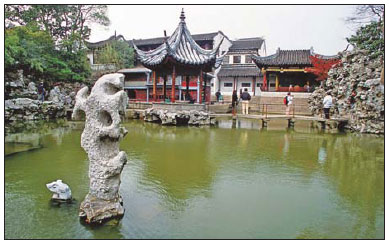Tips and Articles
Tranquility along the path well traveled
Updated: 2011-07-14 07:58
By Sun Li (China Daily)
|
Grotesque rocks, pierced with holes, can be found at every corner of the Lion Grove Garden in Suzhou. Hu Jibin / Asia News Photo |
Jiangsu province's Suzhou can be disconcerting for many first-time visitors.
You've come for the city's well-known classical gardens, but many of them are packed with tourists, which might put you in an edgy mood.
That's why I headed for the Lion Grove Garden that offers a tranquil loveliness, even though it is crowded with sightseers.
Built in 1342 by a monk as part of a Buddhist temple, the Yuan Dynasty (1271-1368) complex was later detached to become a private garden and together with other Suzhou gardens, forms a UNESCO World Heritage site.
Despite being excited about visiting this time-honored place, most travelers tend to go quiet when stepping into the solemn entrance hall.
The entrance is distinguished by the multi-angled overhanging roof and flanked by two lively bronze lions symbolizing dignity.
A winding path brings you into a large square hall named Yuanyang (Mandarin Duck), which signifies harmony, and fittingly provides tranquility.
The roof and the pillars are intricately designed. Adding to the hall's charm are the ornamental latticed windows shaped like flowers or gourds, which frame either a spray of bamboo or a cluster of plum blossoms, echoing the exquisite bamboo and plum wall scrolls.
One interesting scenic spot is Nine Lions Peak, a fine example of Suzhou's exquisite gardens. Surrounded by cypress trees and pines, the miniature peak is constructed of limestone from Taihu Lake.
The garden's centerpiece is its labyrinthine rockery. Also fashioned from Taihu Lake limestone, the grotesque rocks are pierced with holes, many of which vaguely resemble lions.
From different perspectives, you can see an array of rocks looking like lions in varied poses, such as sleeping, roaring or jumping.
There are nine paths and 21 caverns across the stone forest maze. It is easy to get lost walking through these zigzagging pathways.
Legend has it that when Emperor Qianlong (1711-1799) visited the garden, he spent hours navigating the rockery and still could not find a way out.
This, however, is the way to do it: Once you enter the labyrinth and take the first turn left, you need to keep turning left. Or, if you initially choose to go right, just continue making right turns.
A throng of visitors passionate about solving the labyrinth may block the way and slow you down, but there is no need to rush. The rugged rocks are worth a close look. When you eventually emerge from this labyrinth, you can taste the sweetness of outsmarting the emperor.
Not far from the rockery is a large pond teeming with goldfish, which is circled by kiosks, halls and corridors.
The goldfish are obviously used to being fed by tourists and swarm like an army, with their mouths open, whenever you near the pond.
The panorama changes as you move around the pond. The best vista is found at the Flying Waterfall pavilion, the garden's highest point, which sits atop a multilevel limestone grotto.
From here, you can enjoy the summer afternoon breeze and a bird's-eye view of the garden.
The westernmost courtyard's True Delight pavilion is an ideal place to take a rest and have a cup of tea.
The name of the pavilion is also connected with Emperor Qianlong, who personally inscribed the True Delight tablet as a gift.
The surrounding lush evergreens and conifers smell terrific, especially after the rain. The pavilion's front is considered a choice place to view wildflowers in bloom.
As the pavilion is an ideal spot to commune with nature, you can always see painters, photographers and poets, communing with their muses and presenting their art.
China Daily
E-paper

Ringing success
Domestic firms make hay as shopping spree by middle class consumers keeps cash registers ringing in Nanjing
Mixed Results
Crowning achievement
Living happily ever after
Specials

Ciao, Yao
Yao Ming announced his retirement from basketball, staging an emotional end to a glorious career.

Going the distance
British fitness coach comes to terms with tragedy through life changes

Turning up the heat
Traditional Chinese medicine using moxa, or mugwort herb, is once again becoming fashionable

